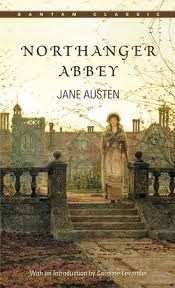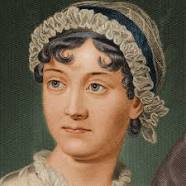Northanger Abbey Page #10
Northanger Abbey was the first of Jane Austen's novels to be completed for publication, in 1803. However, it was not published until after her death in 1817, along with another novel of hers, Persuasion.
“Udolpho was written by Mrs. Radcliffe,” said Catherine, with some hesitation, from the fear of mortifying him. “No sure; was it? Aye, I remember, so it was; I was thinking of that other stupid book, written by that woman they make such a fuss about, she who married the French emigrant.” “I suppose you mean Camilla?” “Yes, that's the book; such unnatural stuff! An old man playing at see-saw, I took up the first volume once and looked it over, but I soon found it would not do; indeed I guessed what sort of stuff it must be before I saw it: as soon as I heard she had married an emigrant, I was sure I should never be able to get through it.” “I have never read it.” “You had no loss, I assure you; it is the horridest nonsense you can imagine; there is nothing in the world in it but an old man's playing at see-saw and learning Latin; upon my soul there is not.” This critique, the justness of which was unfortunately lost on poor Catherine, brought them to the door of Mrs. Thorpe's lodgings, and the feelings of the discerning and unprejudiced reader of Camilla gave way to the feelings of the dutiful and affectionate son, as they met Mrs. Thorpe, who had descried them from above, in the passage. “Ah, Mother! How do you do?” said he, giving her a hearty shake of the hand. “Where did you get that quiz of a hat? It makes you look like an old witch. Here is Morland and I come to stay a few days with you, so you must look out for a couple of good beds somewhere near.” And this address seemed to satisfy all the fondest wishes of the mother's heart, for she received him with the most delighted and exulting affection. On his two younger sisters he then bestowed an equal portion of his fraternal tenderness, for he asked each of them how they did, and observed that they both looked very ugly. These manners did not please Catherine; but he was James's friend and Isabella's brother; and her judgment was further bought off by Isabella's assuring her, when they withdrew to see the new hat, that John thought her the most charming girl in the world, and by John's engaging her before they parted to dance with him that evening. Had she been older or vainer, such attacks might have done little; but, where youth and diffidence are united, it requires uncommon steadiness of reason to resist the attraction of being called the most charming girl in the world, and of being so very early engaged as a partner; and the consequence was that, when the two Morlands, after sitting an hour with the Thorpes, set off to walk together to Mr. Allen's, and James, as the door was closed on them, said, “Well, Catherine, how do you like my friend Thorpe?” instead of answering, as she probably would have done, had there been no friendship and no flattery in the case, “I do not like him at all,” she directly replied, “I like him very much; he seems very agreeable.” “He is as good-natured a fellow as ever lived; a little of a rattle; but that will recommend him to your sex, I believe: and how do you like the rest of the family?” “Very, very much indeed: Isabella particularly.” “I am very glad to hear you say so; she is just the kind of young woman I could wish to see you attached to; she has so much good sense, and is so thoroughly unaffected and amiable; I always wanted you to know her; and she seems very fond of you. She said the highest things in your praise that could possibly be; and the praise of such a girl as Miss Thorpe even you, Catherine,” taking her hand with affection, “may be proud of.” “Indeed I am,” she replied; “I love her exceedingly, and am delighted to find that you like her too. You hardly mentioned anything of her when you wrote to me after your visit there.” “Because I thought I should soon see you myself. I hope you will be a great deal together while you are in Bath. She is a most amiable girl; such a superior understanding! How fond all the family are of her; she is evidently the general favourite; and how much she must be admired in such a place as this--is not she?” “Yes, very much indeed, I fancy; Mr. Allen thinks her the prettiest girl in Bath.” “I dare say he does; and I do not know any man who is a better judge of beauty than Mr. Allen. I need not ask you whether you are happy here, my dear Catherine; with such a companion and friend as Isabella Thorpe, it would be impossible for you to be otherwise; and the Allens, I am sure, are very kind to you?” “Yes, very kind; I never was so happy before; and now you are come it will be more delightful than ever; how good it is of you to come so far on purpose to see me.” James accepted this tribute of gratitude, and qualified his conscience for accepting it too, by saying with perfect sincerity, “Indeed, Catherine, I love you dearly.” Inquiries and communications concerning brothers and sisters, the situation of some, the growth of the rest, and other family matters now passed between them, and continued, with only one small digression on James's part, in praise of Miss Thorpe, till they reached Pulteney Street, where he was welcomed with great kindness by Mr. and Mrs. Allen, invited by the former to dine with them, and summoned by the latter to guess the price and weigh the merits of a new muff and tippet. A pre-engagement in Edgar's Buildings prevented his accepting the invitation of one friend, and obliged him to hurry away as soon as he had satisfied the demands of the other. The time of the two parties uniting in the Octagon Room being correctly adjusted, Catherine was then left to the luxury of a raised, restless, and frightened imagination over the pages of Udolpho, lost from all worldly concerns of dressing and dinner, incapable of soothing Mrs. Allen's fears on the delay of an expected dressmaker, and having only one minute in sixty to bestow even on the reflection of her own felicity, in being already engaged for the evening. CHAPTER 8 In spite of Udolpho and the dressmaker, however, the party from Pulteney Street reached the Upper Rooms in very good time. The Thorpes and James Morland were there only two minutes before them; and Isabella having gone through the usual ceremonial of meeting her friend with the most smiling and affectionate haste, of admiring the set of her gown, and envying the curl of her hair, they followed their chaperones, arm in arm, into the ballroom, whispering to each other whenever a thought occurred, and supplying the place of many ideas by a squeeze of the hand or a smile of affection. The dancing began within a few minutes after they were seated; and James, who had been engaged quite as long as his sister, was very importunate with Isabella to stand up; but John was gone into the card-room to speak to a friend, and nothing, she declared, should induce her to join the set before her dear Catherine could join it too. “I assure you,” said she, “I would not stand up without your dear sister for all the world; for if I did we should certainly be separated the whole evening.” Catherine accepted this kindness with gratitude, and they continued as they were for three minutes longer, when Isabella, who had been talking to James on the other side of her, turned again to his sister and whispered, “My dear creature, I am afraid I must leave you, your brother is so amazingly impatient to begin; I know you will not mind my going away, and I dare say John will be back in a moment, and then you may easily find me out.” Catherine, though a little disappointed, had too much good nature to make any opposition, and the others rising up, Isabella had only time to press her friend's hand and say, “Good-bye, my dear love,” before they hurried off. The younger Miss Thorpes being also dancing, Catherine was left to the mercy of Mrs. Thorpe and Mrs. Allen, between whom she now remained. She could not help being vexed at the non-appearance of Mr. Thorpe, for she not only longed to be dancing, but was likewise aware that, as the real dignity of her situation could not be known, she was sharing with the scores of other young ladies still sitting down all the discredit of wanting a partner. To be disgraced in the eye of the world, to wear the appearance of infamy while her heart is all purity, her actions all innocence, and the misconduct of another the true source of her debasement, is one of those circumstances which peculiarly belong to the heroine's life, and her fortitude under it what particularly dignifies her character. Catherine had fortitude too; she suffered, but no murmur passed her lips.
Translation
Translate and read this book in other languages:
Select another language:
- - Select -
- 简体中文 (Chinese - Simplified)
- 繁體中文 (Chinese - Traditional)
- Español (Spanish)
- Esperanto (Esperanto)
- 日本語 (Japanese)
- Português (Portuguese)
- Deutsch (German)
- العربية (Arabic)
- Français (French)
- Русский (Russian)
- ಕನ್ನಡ (Kannada)
- 한국어 (Korean)
- עברית (Hebrew)
- Gaeilge (Irish)
- Українська (Ukrainian)
- اردو (Urdu)
- Magyar (Hungarian)
- मानक हिन्दी (Hindi)
- Indonesia (Indonesian)
- Italiano (Italian)
- தமிழ் (Tamil)
- Türkçe (Turkish)
- తెలుగు (Telugu)
- ภาษาไทย (Thai)
- Tiếng Việt (Vietnamese)
- Čeština (Czech)
- Polski (Polish)
- Bahasa Indonesia (Indonesian)
- Românește (Romanian)
- Nederlands (Dutch)
- Ελληνικά (Greek)
- Latinum (Latin)
- Svenska (Swedish)
- Dansk (Danish)
- Suomi (Finnish)
- فارسی (Persian)
- ייִדיש (Yiddish)
- հայերեն (Armenian)
- Norsk (Norwegian)
- English (English)
Citation
Use the citation below to add this book to your bibliography:
Style:MLAChicagoAPA
"Northanger Abbey Books." Literature.com. STANDS4 LLC, 2025. Web. 24 Feb. 2025. <https://www.literature.com/book/northanger_abbey_45>.








Discuss this Northanger Abbey book with the community:
Report Comment
We're doing our best to make sure our content is useful, accurate and safe.
If by any chance you spot an inappropriate comment while navigating through our website please use this form to let us know, and we'll take care of it shortly.
Attachment
You need to be logged in to favorite.
Log In